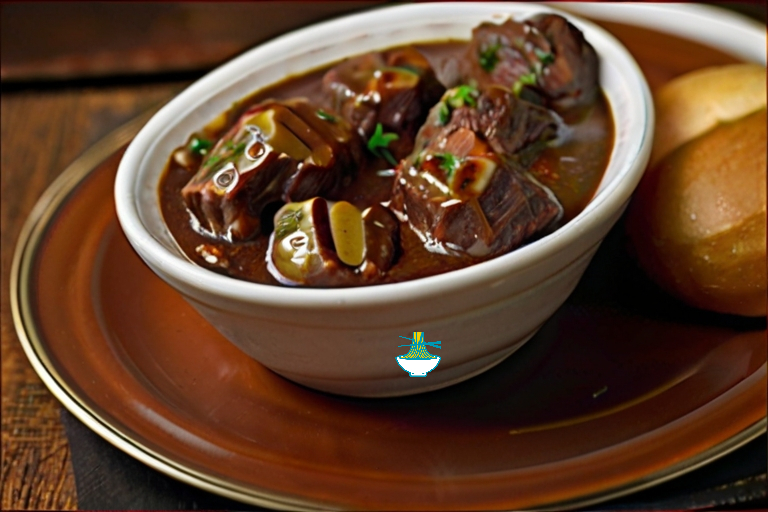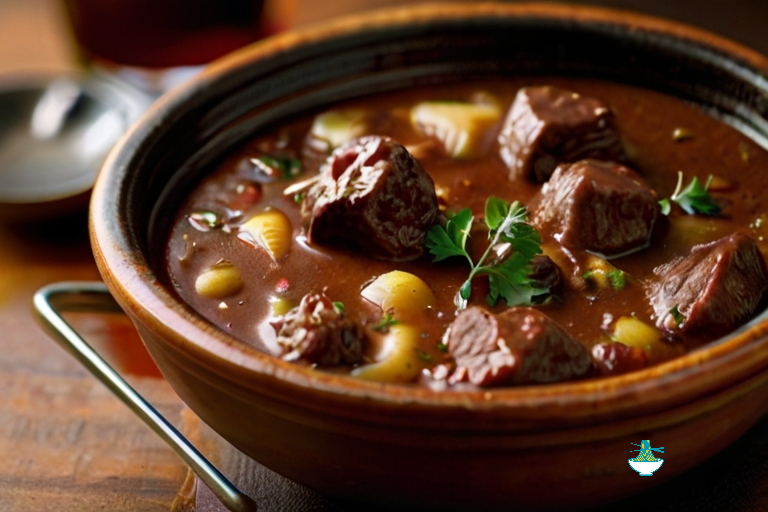Welcome to the culinary heart of Belgium, where hearty dishes steeped in tradition and flavor await. Among these delights is Carbonnade Flamande, a beloved Belgian stew that embodies the essence of comfort food. This dish, with its tender beef, caramelized onions, and robust beer-infused sauce, is a testament to Belgian culinary prowess and heritage.
Originating from the Flanders region, Carbonnade Flamande is a timeless classic that has graced tables for generations, particularly during chilly evenings when warmth and sustenance are most cherished. Its preparation involves a slow simmering process that allows the ingredients to meld together, creating a symphony of flavors that dance on the palate.
Join us on a culinary journey as we delve into the intricacies of crafting this quintessential Belgian dish. From selecting the finest ingredients to mastering the art of simmering, we'll guide you through each step, ensuring that your Carbonnade Flamande is nothing short of exceptional. So, roll up your sleeves, gather your pots and pans, and let's embark on a gastronomic adventure through the heart of Belgium.
Ingredients:
- 2 pounds (about 900g) beef chuck, cut into cubes
- 3 large onions, thinly sliced
- 3 cloves garlic, minced
- 2 tablespoons all-purpose flour
- 2 tablespoons butter
- 2 tablespoons olive oil
- 2 cups (475ml) Belgian beer (such as a Belgian ale or brown ale)
- 1 cup (240ml) beef broth
- 2 tablespoons brown sugar
- 2 tablespoons Dijon mustard
- 2 bay leaves
- Salt and pepper to taste
- Chopped fresh parsley for garnish (optional)
Instructions:
1- Pat the beef cubes dry with paper towels and season generously with salt and pepper.
2- In a large Dutch oven or heavy-bottomed pot, heat the butter and olive oil over medium-high heat. Add the beef cubes in batches and brown them on all sides. Transfer the browned beef to a plate and set aside.
3- In the same pot, add the sliced onions and cook, stirring occasionally, until they are caramelized and golden brown, about 15-20 minutes. Add the minced garlic and cook for an additional 1-2 minutes.
4- Sprinkle the flour over the onions and garlic, stirring to coat evenly. Cook for 1-2 minutes to remove the raw flour taste.
5- Return the browned beef cubes to the pot. Pour in the Belgian beer and beef broth, stirring to deglaze the bottom of the pot and scrape up any browned bits. Add the brown sugar, Dijon mustard, and bay leaves. Bring the mixture to a simmer.
6- Once simmering, reduce the heat to low and cover the pot with a lid. Let the Carbonnade Flamande simmer gently for 2-3 hours, stirring occasionally, until the beef is tender and the sauce has thickened.
7- Taste and adjust the seasoning with salt and pepper if needed. Remove the bay leaves before serving.
8- Serve the Carbonnade Flamande hot, garnished with chopped fresh parsley if desired. This hearty stew pairs well with crusty bread, mashed potatoes, or fries. Enjoy the rich flavors of Belgian cuisine!
Nutritional Values:
Here's an approximate nutritional breakdown for the ingredients used in the Carbonnade Flamande recipe:
Beef Chuck (2 pounds / about 900g):
- Calories: 1700 kcal
- Protein: 160g
- Fat: 110g
- Carbohydrates: 0g
- Fiber: 0g
benefits: A good source of protein, iron, zinc, and B vitamins, beef chuck provides essential nutrients for muscle growth, energy production, and overall health.
Onions (3 large):
- Calories: 150 kcal
- Protein: 3g
- Fat: 0g
- Carbohydrates: 36g
- Fiber: 6g
benefits: Onions are rich in antioxidants, vitamins C and B6, and dietary fiber. They may help boost immunity, support heart health, and improve digestion.
Garlic (3 cloves):
- Calories: 13 kcal
- Protein: 0.6g
- Fat: 0.03g
- Carbohydrates: 3g
- Fiber: 0.2g
benefits: Garlic contains allicin, a compound with potent medicinal properties. It has been linked to various health benefits, including improved cardiovascular health, immune support, and reduced risk of certain cancers.
All-purpose flour (2 tablespoons):
- Calories: 60 kcal
- Protein: 2g
- Fat: 0g
- Carbohydrates: 12g
- Fiber: 0g
benefits: While not particularly nutrient-dense, all-purpose flour provides carbohydrates for energy and serves as a thickening agent in recipes like stews and sauces.
Butter (2 tablespoons):
- Calories: 204 kcal
- Protein: 0.2g
- Fat: 23g
- Carbohydrates: 0g
- Fiber: 0g
benefits: Butter is a source of saturated fats, which provide energy and support hormone production. It also contains vitamins A, E, and K2.
Olive oil (2 tablespoons):
- Calories: 240 kcal
- Protein: 0g
- Fat: 28g
- Carbohydrates: 0g
- Fiber: 0g
benefits: Olive oil is rich in monounsaturated fats and antioxidants, such as vitamin E and polyphenols. It is known for its heart-healthy benefits, including reducing inflammation and improving cholesterol levels.
Belgian beer (2 cups / 475ml):
- Nutritional values vary significantly based on the specific beer used.
benefits: Depending on the type, Belgian beer may contain antioxidants, vitamins, and minerals like magnesium and potassium. Moderate consumption has been associated with heart health benefits.
Beef broth (1 cup / 240ml):
- Calories: 15 kcal
- Protein: 2g
- Fat: 0g
- Carbohydrates: 1g
- Fiber: 0g
benefits: Beef broth provides hydration and adds flavor to dishes. It may contain collagen, which supports joint health and may benefit skin and hair.
Brown sugar (2 tablespoons):
- Calories: 90 kcal
- Protein: 0g
- Fat: 0g
- Carbohydrates: 24g
- Fiber: 0g
benefits: rown sugar adds sweetness to dishes. While it provides calories, it lacks significant nutritional benefits compared to other sweeteners.
Dijon mustard (2 tablespoons):
- Calories: 30 kcal
- Protein: 1g
- Fat: 2g
- Carbohydrates: 2g
- Fiber: 0g
benefits: Mustard is low in calories and contains antioxidants and certain minerals. Dijon mustard specifically adds a tangy flavor to recipes and can enhance digestion.
Bay leaves (2):
- Negligible calories and macronutrients
benefits: Bay leaves contribute aroma and flavor to dishes but have minimal nutritional value. They are often used for their culinary properties rather than their health benefits.
Salt and pepper (to taste):
- Negligible calories and macronutrients
benefits: Salt adds flavor and enhances the taste of food, while pepper adds a spicy kick. Both are used in moderation to season dishes.
Chopped fresh parsley (optional):
- Negligible calories and macronutrients
benefits: Parsley is rich in vitamins A, C, and K, as well as antioxidants and minerals like calcium and iron. It adds freshness and color to dishes and may support overall health.
Keep in mind that these values are approximate and can vary based on factors such as specific brands of ingredients and cooking methods.


Comments